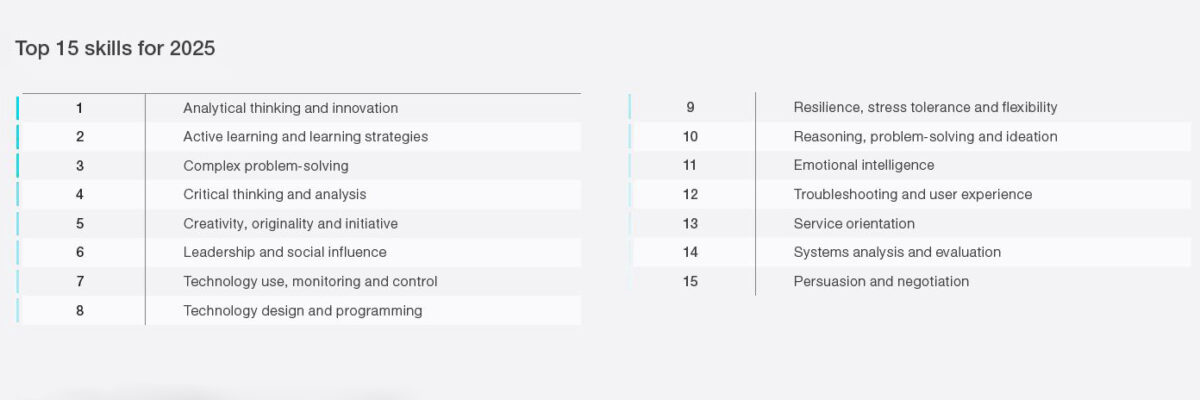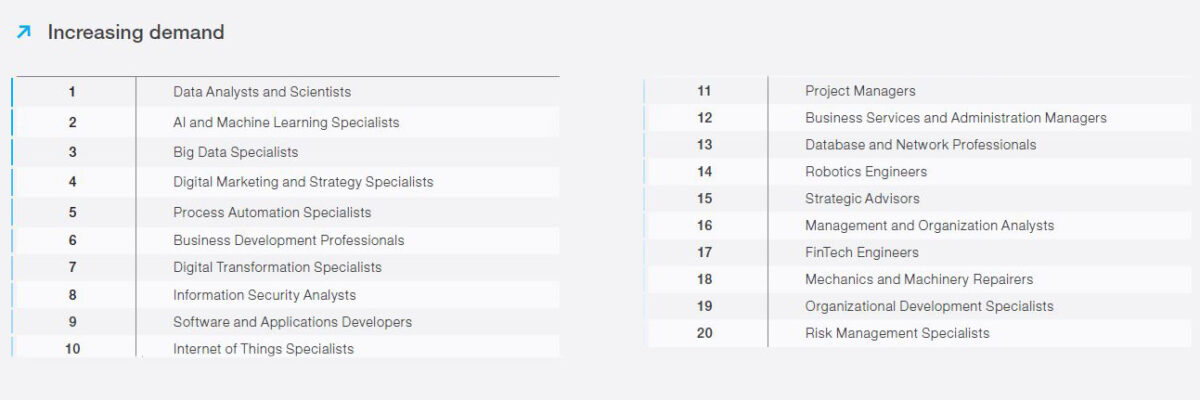Technology and innovation common keyphrases used to define the future of jobs, skills and businesses. Covid-19 pandemic is shaping short-term shocks and long-term trends in the business world. And as businesses adapt to the new normal, companies’ expectations from workers are changing. Moreover, shifts in the business world which were once expected to take place in the next decade are entering our lives here and now. Today, during this transition period, technology related jobs are becoming very desirable. Employers are searching for new skills and new online workplaces. As a result, highly specialized jobs in the technology field are getting popular. Below is a summary of the short- and long-term trends awiting the business world.
Future of Jobs: Trends in the Businessworld

Crucial Skills for the Future Businessworld
Industry needs and standards are changing rapidly and will continue to do so in the next decade. Because of this companies are now expecting workers to develop work-related skills during employment. Fast developments in existing industries and shortage of skilled workers explain why companies value adaptability.
There are two types of skills that employees can develop at work: intra-personal skills and work skills.
94% of business leaders report that they expect employees to pick up new skills on the job. – WEF
Intrapersonal skills can be described as the ability to monitor one’s emotions and use them to guide personal behavior. In today’s work world some of the most sought out interpersonal skills are flexibility, receptiveness, resilience, originality, stress tolerance and leadership skills . Generally speaking, employers think that these skills ease workplace tensions and improve efficiency of social work environments. Luckily, employees who are interested in working on their intrapersonal skills only need one simple thing: self-awareness.

Top 15 skills for 2025
1 Analytical thinking and innovation 2 Active learning and learning strategies 3 Complex problem-solving 4 Critical thinking and analysis 5 Creativity, originality and initiative 6 Leadership and social influence 7 Technology use, monitoring and control 8 Technology design and programming 9 Resilience, stress tolerance and flexibility 10 Reasoning, problem-solving and ideation 11 Emotional intelligence 12 Troubleshooting and user experience 13 Service orientation 14 Systems analysis and evaluation 15 Persuasion and negotiation
Work-related skills can be described as scientific knowledge one can learn through reading and studying. Today, experts list technology design, programming, user experience, computer program knowledge, systems and data analysisas some of the most valuable work-skills employees can pick-up. Almost all companies state that hiring employees with up-to-date work skills maximize their work efficiency and increase their market competitiveness.
Employees who wish to keep up with new work skills ask that companies and governments provide access to learning platforms. For this reason potential employees are starting to prefer working at companies which provide online-learning platforms and monthly re-skilling courses.
“(our in-house education department) is responsible for training and cross-training people as they develop in their careers.” – Ed Catmull, Pixar Animation Studios
Without a doubt, the cinema industry is a sector that puts incredible amount of value to up-to-date work skills and knowledge. It is easy to see the how much the sector values contemporary knowledge by taking a look at learning platforms established by industry leader studios. For example, Pixar Animation Studios is home to one of the biggest in-house learning departments in the USA. Nicknamed as “Pixar University” by employees, the department provides a large range of classes to employees. These classes range from figure drawing, to sculpture, dance and scenario writing.
Stars of the Future: Information and Computer Technology Jobs
Information and computer technology industry grows larger as computer and phones become a bigger part of our lives. Growth rate of the industry promises a successful future to programming, information technologies and computer science areas. Consequently computer related jobs make up 8 of 20 most demanded jobs. Particularly, demand for jobs that require specialized skills such as data analysts, data scientists, artificial intelligence specialists, big data specialists is increasing. In fact, the current demand for specialized workers foreshadows the future trend of highly specialized jobs.
“Individuals moving into Data and AI lack key data science skills but are able to work towards the right skill set through mastery of skills such as statistical programming within a recommended time frame, in this case, 76 days of learning.” – WEF
In addition, growth of the technology sphere is positively impacting other industries. Especially creative jobs such as graphic design, experience design and writing are benefiting from this boom as the digital world provides endless possibilities for these endeavors.

1 Data Analysts and Scientists 2 AI and Machine Learning Specialists 3 Big Data Specialists 4 Digital Marketing and Strategy Specialists 5 Process Automation Specialists 6 Business Development Professionals 7 Digital Transformation Specialists 8 Information Security Analysts 9 Software and Applications Developers 10 Internet of Things Specialists 11 Project Managers 12 Business Services and Administration Managers 13 Database and Network Professionals 14 Robotics Engineers 15 Strategic Advisors 16 Management and Organization Analysts 17 FinTech Engineers 18 Mechanics and Machinery Repairers 19 Organizational Development Specialists 20 Risk Management Specialists
Nowadays, human-computer interaction has become a part of our daily lives, shining light on technology disciplines such as user experience and user interaction design. These disciplines meet the needs of technology users by visualizing virtual environments. Perhaps the earliest example of this phenomena is the design of desktop screens on our monitors which organized lines of green code into visual landscape.
The New Standard: Online Offices
Due to pandemic related restraints, companies are replacing offices with digital workspaces. Employees are making use of internet calls and computers instead of meeting rooms and cubicles. Online working which was once predicted to become popular in 2030, is being widely adapted by many international companies.
The digital office is bringing many unforeseen changes along with its implementation. Geographical freedom and personalized schedules are two major positive impacts of online offices. At this moment in time employees are enjoying working independently from home. Many people are moving away from cities into smaller towns they would like to live in. Furthermore, employees from all over the world are applying to work in the same offices.

Technology giants are leading the way in the digitalization process. Global companies with campuses in the Silicon Valley are permanently closing their physical offices and switching to the online offices. Coinbase, Square and Zelle have already decided to permanently shift to online offices. Where as Facebook, MasterCard and Twitter are utilizing home offices until further notice.
The future of jobs is arriving quicker then we can ever imagine. Creating a strategy for best future investment you can make for your company. Adapting to future workflows and standards will improve your efficiency and success in the long run.
__
World Economic Forum “https://www.weforum.org/reports/the-future-of-jobs-report-2020”
 Primitive Use of Artificial Intelligence: A Look from Past to Present
Primitive Use of Artificial Intelligence: A Look from Past to Present  The Future of Medical Design
The Future of Medical Design  A Night Full of Prizes: Celebrating 4 Wins at iF Design Awards 2023
A Night Full of Prizes: Celebrating 4 Wins at iF Design Awards 2023